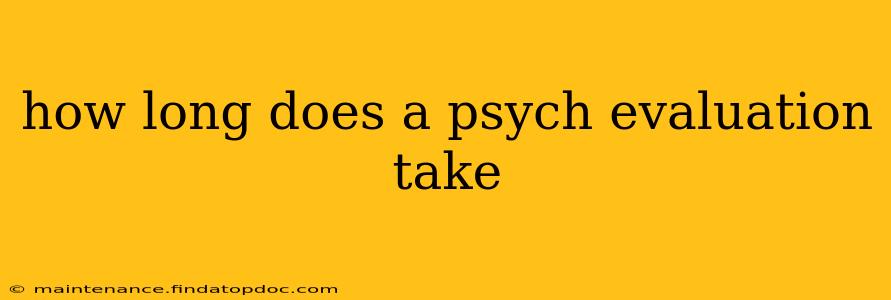The length of a psychological evaluation varies significantly depending on several factors. There's no one-size-fits-all answer, and what might take a few hours for one person could require multiple sessions for another. Understanding the factors influencing the duration is key to managing expectations.
What Factors Determine the Length of a Psych Evaluation?
Several key factors determine how long a psychological evaluation will take:
-
Reason for the Evaluation: A brief screening for a specific concern, like anxiety or depression, might only require one session. Conversely, a comprehensive evaluation for a court case, disability claim, or complex mental health issues could necessitate several hours spread across multiple appointments.
-
The Evaluator's Approach: Different psychologists and psychiatrists employ various methods and assessment tools. Some may rely heavily on interviews, while others incorporate extensive testing. The evaluator's preferred style significantly influences the evaluation's length.
-
The Complexity of the Case: Individuals presenting with multiple symptoms, a history of trauma, or complex medical history will generally require more thorough evaluations. This involves more in-depth interviews, testing, and potentially collateral information gathering (speaking with family members or others).
-
The Number of Assessments Used: Psychological evaluations often involve multiple assessment tools, including questionnaires, intelligence tests, personality tests, and projective techniques. Each assessment adds to the overall time commitment. For example, a comprehensive neuropsychological evaluation can take many hours.
-
The Client's Needs and Cooperation: A client's ability to engage fully in the evaluation process impacts the time required. If a client is hesitant or struggles to focus, the evaluation may take longer to complete.
How Long Are Different Types of Psych Evaluations?
While specific times are impossible to give without knowing the individual circumstances, here's a general overview:
Brief Screening:
This might involve a single 30-60 minute session focusing on a specific concern. The psychologist will use an interview to assess symptoms and determine if further evaluation is needed.
Comprehensive Psychological Evaluation:
This often involves multiple sessions, each lasting 60-90 minutes or more. It may include interviews, testing, and a review of relevant records. The total time could range from several hours to several days, spread across weeks or months.
Neuropsychological Evaluation:
These evaluations are typically the longest, often involving several sessions over multiple days. They assess cognitive functioning and are used to diagnose conditions like traumatic brain injury, dementia, or learning disabilities.
What Happens During a Psych Evaluation?
Generally, a psychological evaluation includes:
- Intake Interview: Gathering background information about the individual's history, symptoms, and concerns.
- Psychological Testing: Administering various tests to measure cognitive abilities, personality traits, and emotional functioning.
- Collateral Information: Gathering information from family members, teachers, employers, or other relevant individuals.
- Diagnostic Interview: A structured interview to assess symptoms and determine if they meet the criteria for a specific diagnosis.
- Feedback Session: The psychologist reviews the findings and provides a diagnosis and recommendations.
What are the Common Types of Psychological Tests Used?
A wide variety of tests might be used. Examples include:
- Intelligence Tests (IQ Tests): Wechsler Adult Intelligence Scale (WAIS), Stanford-Binet Intelligence Scales.
- Personality Tests: Minnesota Multiphasic Personality Inventory (MMPI), Rorschach Inkblot Test, Thematic Apperception Test (TAT).
- Symptom Questionnaires: Beck Depression Inventory (BDI), Generalized Anxiety Disorder 7-item (GAD-7) scale.
How Much Does a Psych Evaluation Cost?
The cost of a psychological evaluation varies greatly depending on location, the type of evaluation needed, and the provider's fees. It's essential to discuss fees upfront with the psychologist or psychiatrist.
Remember, this information is for general knowledge and should not be considered medical advice. If you are considering a psychological evaluation, it's crucial to consult with a qualified mental health professional to discuss your specific needs and what to expect.
